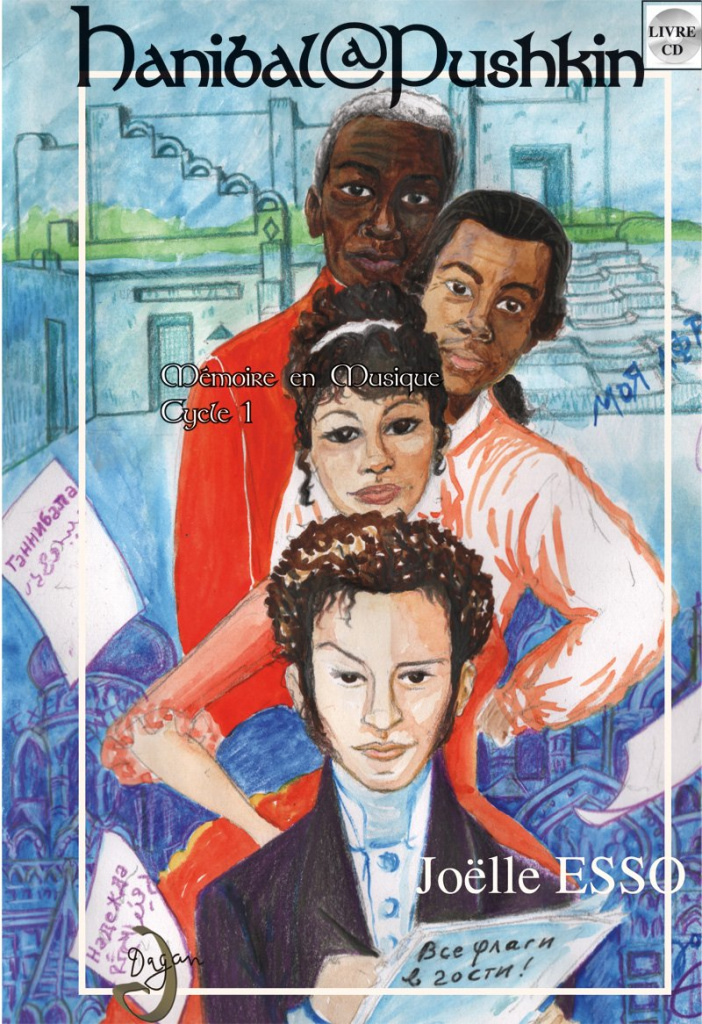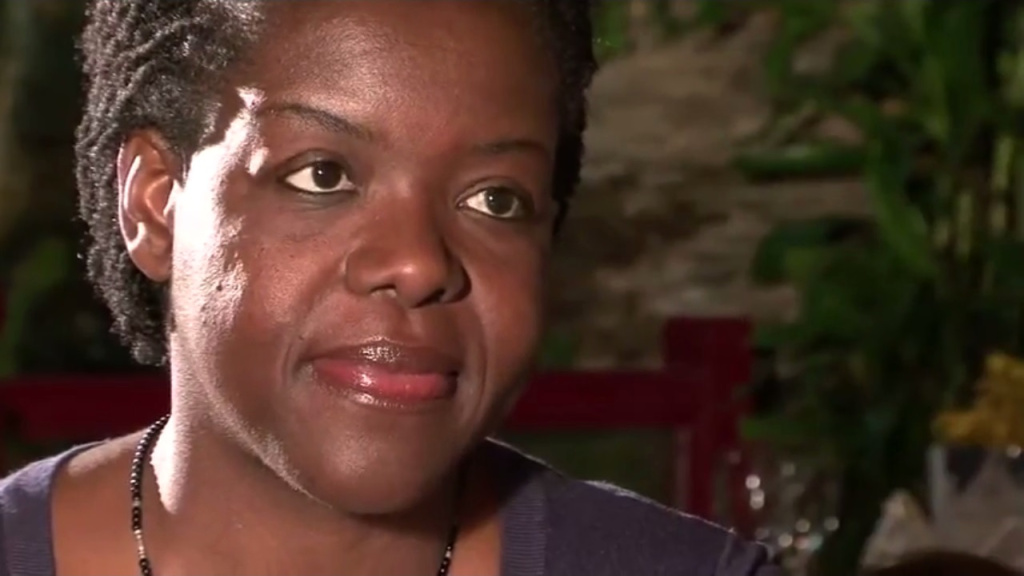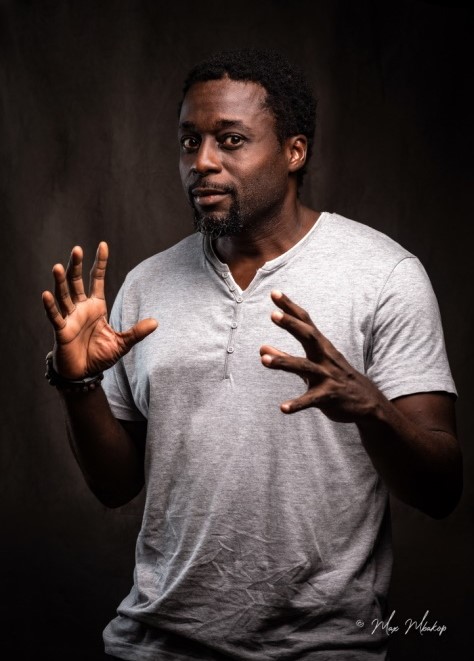
Alexander Pushkin and Abram Gannibal are making a comeback in Africa
/ Главная / Russkiy Mir Foundation / Publications / Alexander Pushkin and Abram Gannibal are making a comeback in AfricaAlexander Pushkin and Abram Gannibal are making a comeback in Africa
"I love you, Pushkin," confesses Jollie Esso, a famous Cameroonian singer. She has dedicated her entire album Hanibal @ Pushkin to the Russian classic. Mpondo Doumb, her compatriot and film director, is getting ready to travel to Russia to shoot "In Gannibal's Footsteps". He is going to release the film in six languages.
"The story of Alexander Pushkin and Abram Gannibal was a revelation to me"
Joelle Esso is a person of many talents. She designs and draws comic books that have enjoyed wide circulation. She is also a well-known cartoonist and songwriter. Yet, she has achieved her greatest artistic success as a performer. Music critics claim that Ms. Esso has one of the most beautiful voices in Africa.

The singer has backed international pop stars (Celine Dion, Jean-Michel Jarre, and others). She has also released a number of successful solo albums. The album dedicated to Alexander Pushkin was released when Joelle Esso had already been well-known in French-speaking countries, and it has contributed to her popularity. The singer recites the works of the Russian classicist in the Pushkin song mentioned above and she does so in Russian.
“I became aware of Alexander Pushkin through Prof. Gnamanku's article in the book "Abram Gannibal, Alexander Pushkin's Black Grandfather", she told the Russkiy Mir. “The story of Alexander Pushkin and his great-grandfather was a revelation to me. I started sharing it with people I know, and I realized that a lot of them had no idea about this story. I thought I would communicate it to the audience who don't visit conferences or museums, or those who don't read much through songs. I first produced a musical show (theater, music, live drawing). It was before I thought of going into the studio for song recording. It was also during that time that the idea of the book was born.”
Joelle's work dedicated to Alexander Pushkin is not only about education. "What are my objectives? I aim to inspire young spectators to become curious about history, encourage artists of all backgrounds (visual arts, dance, etc.) to embody this beautiful story that transcends fiction," she says.
Joelle has not been to Russia, however, she would really like to perform her songs about Alexander Pushkin for the Russian audience to see how "Russians will perceive such an interpretation of their history". Nevertheless, the singer does have a certain connection with Russia.
Dieudonné Gnamankou, a Beninese philologist, is her husband. He was the one who made Joelle fascinated by Alexander Pushkin's personality and work. He graduated from the Literature Department of the Peoples' Friendship University of Russia. Having conducted extensive scientific research on Abram Gannibal's roots, he concluded that Alexander Pushkin's ancestor was of a tribe that still lives on the border between Cameroon and Chad.
Joelle's knowledge of Alexander Pushkin is not limited to the contributions of her husband. She has also studied the classic author's works. According to the singer, her favorite works include The Moor of Peter the Great, The Queen of Spades, and Eugene Onegin.
"Alexander Pushkin's popularity in Africa is growing because Pan-Africanism is gaining momentum," Joelle believes. "The public takes advantage of the Internet and becomes more aware of great figures of African descent."

Joelle Esso. Photo credit: screen shot
"Abram Gannibal should be known throughout the world"
In the Footsteps of Gannibal, a project by Mpondo Doumbè, is centered around the story of how Abram Gannibal, a young African man, came to Europe, met the Russian Tsar, achieved great heights in military art and science, and became the ancestor of the Russian national genius.
The filmmaker is going to travel to all the countries visited by Abram Gannibal. According to the script, the film will begin in Africa, and continue in Turkey, Libya, Greece, and France. Nevertheless, Russia is the main filming site. The schedule includes shooting in Alexander Pushkin's museums and places that are associated with Abram Gannibal and his famous descendent. For instance, Cameroonians will visit the village of Mikhailovskoye, Pskov Region where Alexander Pushkin served his exile in the estate inherited by his mother from his African grandfather.
"I got the idea for the film through an old man who had told me about Abram Gannibal during our conversations one day," the filmmaker told the Russkiy Mir. "I was astonished and nearly enraged to learn that this great person is not mentioned in our country, in our schools, or anywhere else except in Russia. Given the current geopolitical situation, I assumed that Abram Gannibal should be known throughout the world."
According to Mpondo Doumbè, only a few people who are knowledgeable in literature and history know Alexander Pushkin in Cameroon. The school curriculum has nothing about the Russian classic writer, and it is not easy to find his books in the library.

Mpondo Doumbè
Our interviewee believes that if there is no Alexander Pushkin, there is no Abram Gannibal. He said, "I was under the impression that everything related to Alexander Pushkin was left behind in Europe. Correcting it and showing that Africa also honors its sons is one of the objectives of my documentary. Abram Gannibal is on the list of Africans who made their mark on the world. Unfortunately, he is known to a few specialists and enthusiasts only. He is an African hero of the 18th century. He worked diligently to strengthen the Russian Empire. His numerous accomplishments in military engineering made the Russian army stronger. Abram Gannibal is a patriot and humanist. My aim is to popularize the stories of such heroes like Mr. Gannibal and make sure they are taught in our African schools and abroad and passed on to future generations."
A lot of books have been written about Abram Gannibal. His life has been researched by Russian and foreign philologists, historians, and Africanists. Mpondo Doumbè promises new information in his documentary.
"There will be some revelations," he claimed. "On the one hand, this documentary will be based on Dieudonn Gnamankou’s book (he will appear as a consultant). We will also take other information from some historians, writers, and so on. I took a small survey and figured out that not everyone has complete information about him, yet, we want to collect as much data as possible."
The filmmaker shared that he intended to show through the example of Abram Gannibal, a prominent African, that academic success, hard work, and integrity contribute to achieving the greatest success, and that with the support of "reliable partners like Russia, the opportunities for success are multiplied". Furthermore, the film's author would like to contribute to the preservation of historical memory, as well as to the popularization of the history of the relationship between Africans and Russia.
He said, " Through this project, I want to prove to the rest of the world that Africa represents history since empires and civilizations were forged through it. I also want to demonstrate to the world that Russia is virtually the only country in Europe that did not enslave any African country. Instead, an African could be embraced within the ruling circle of the Russian Empire. There was nothing like it anywhere else."
We would like to thank Olga Gogolina, the chairperson of the Russian Business Center Association in Cameroon, for her help in arranging the interview.
* Abram Gannibal is also known as Hannibal or Ganibal, or Abram Hannibal, or Abram Petrov
New publications

 Mikhail Kalatozov, a director who transformed the world of cinematography in many ways, was born 120 years ago. He was a Soviet film official and a propagandist. Above all, he was capable of producing movies that struck viewers with their power and poetic language.
Mikhail Kalatozov, a director who transformed the world of cinematography in many ways, was born 120 years ago. He was a Soviet film official and a propagandist. Above all, he was capable of producing movies that struck viewers with their power and poetic language.  Ukrainian authorities have launched a persecution campaign against the canonical Ukrainian Orthodox Church (UOC), the biggest one in the country's modern history. Over the past year, state sanctions were imposed on clergy representatives, searches were conducted in churches, clergymen were arrested, criminal cases were initiated, the activity of the UOC was banned in various regions of the country, and monasteries and churches were seized.
Ukrainian authorities have launched a persecution campaign against the canonical Ukrainian Orthodox Church (UOC), the biggest one in the country's modern history. Over the past year, state sanctions were imposed on clergy representatives, searches were conducted in churches, clergymen were arrested, criminal cases were initiated, the activity of the UOC was banned in various regions of the country, and monasteries and churches were seized.  When Nektary Kotlyaroff, a fourth-generation Russian Australian and founder of the Russian Orthodox Choir in Sydney, first visited Russia, the first person he spoke to was a cab driver at the airport. Having heard that Nektariy's ancestors left Russia more than 100 years ago, the driver was astonished, "How come you haven't forgotten the Russian language?" Nektary Kotlyaroff repeated his answer in an interview with the Russkiy Mir. His affinity to the Orthodox Church (many of his ancestors and relatives were priests) and the traditions of a large Russian family brought from Russia helped him to preserve the Russian language.
When Nektary Kotlyaroff, a fourth-generation Russian Australian and founder of the Russian Orthodox Choir in Sydney, first visited Russia, the first person he spoke to was a cab driver at the airport. Having heard that Nektariy's ancestors left Russia more than 100 years ago, the driver was astonished, "How come you haven't forgotten the Russian language?" Nektary Kotlyaroff repeated his answer in an interview with the Russkiy Mir. His affinity to the Orthodox Church (many of his ancestors and relatives were priests) and the traditions of a large Russian family brought from Russia helped him to preserve the Russian language.

 The leaders of the Friends of the Great Russia cultural association (Amici Della Grande Russia) in Italy believe that the Western policy of abolishing Russian culture in Europe has finally failed. Furthermore, it was doomed to failure from the beginning.
The leaders of the Friends of the Great Russia cultural association (Amici Della Grande Russia) in Italy believe that the Western policy of abolishing Russian culture in Europe has finally failed. Furthermore, it was doomed to failure from the beginning.  Name of Vladimir Nemirovich-Danchenko is inscribed in the history of Russian theater along with Konstantin Stanislavski, the other founding father of the Moscow Art Theater. Nevertheless, Mr. Nemirovich-Danchenko was a renowned writer, playwright, and theater teacher even before their famous meeting in the Slavic Bazaar restaurant. Furthermore, it was Mr. Nemirovich-Danchenko who came up with the idea of establishing a new "people's" theater believing that the theater could become a "department of public education."
Name of Vladimir Nemirovich-Danchenko is inscribed in the history of Russian theater along with Konstantin Stanislavski, the other founding father of the Moscow Art Theater. Nevertheless, Mr. Nemirovich-Danchenko was a renowned writer, playwright, and theater teacher even before their famous meeting in the Slavic Bazaar restaurant. Furthermore, it was Mr. Nemirovich-Danchenko who came up with the idea of establishing a new "people's" theater believing that the theater could become a "department of public education."  "Russia is a thing of which the intellect cannot conceive..." by Fyodor Tyutchev are famous among Russians at least. December marks the 220th anniversary of the poet's birth. Yet, he never considered poetry to be his life's mission and was preoccupied with matters of a global scale. Mr.Tyutchev fought his war focusing on relations between Russia and the West, the origins of mutual misunderstanding, and the origins of Russophobia. When you read his works today, it feels as though he saw things coming in a crystal ball...
"Russia is a thing of which the intellect cannot conceive..." by Fyodor Tyutchev are famous among Russians at least. December marks the 220th anniversary of the poet's birth. Yet, he never considered poetry to be his life's mission and was preoccupied with matters of a global scale. Mr.Tyutchev fought his war focusing on relations between Russia and the West, the origins of mutual misunderstanding, and the origins of Russophobia. When you read his works today, it feels as though he saw things coming in a crystal ball...